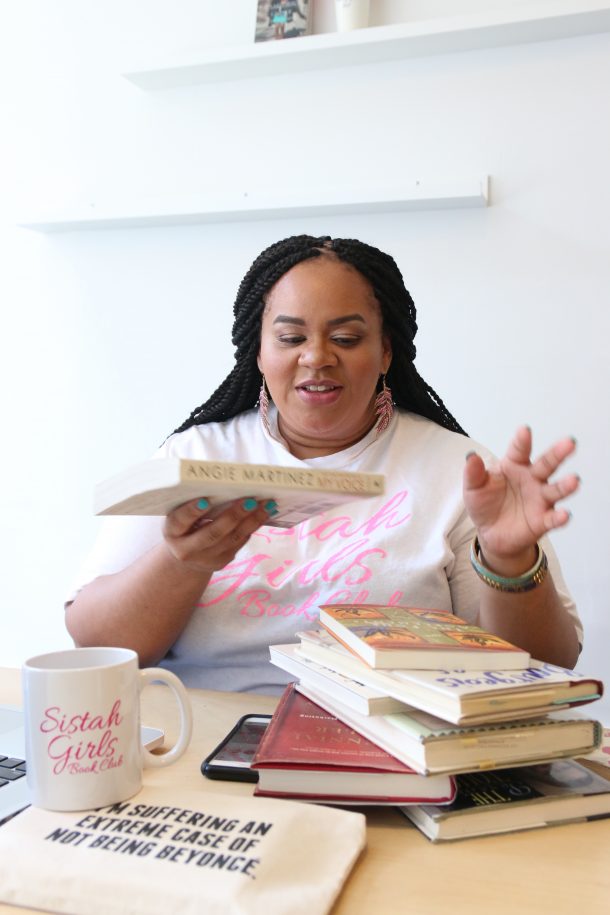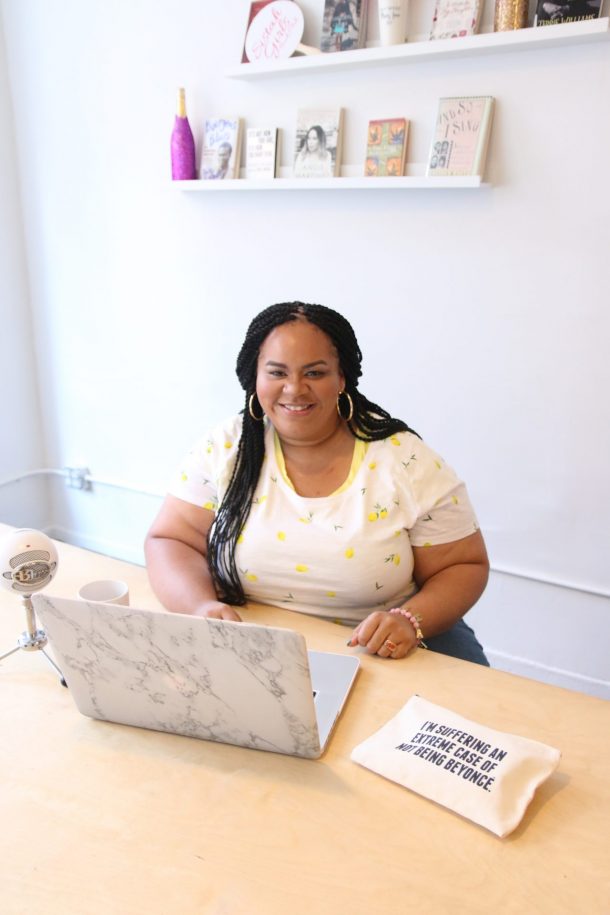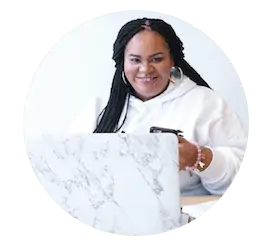Sistah Girls, it is with a heavy heart that I must borrow the words of the late Marvin Gaye and ask, “What’s going on?”
Ya favorite Midwest Gypsy has been scrolling down the timelines lately and I can’t help but notice the heat boiling between some of our author baes and the friends who read their works.
Unfortunately, when I say heat, I’m not talking about the kind that comes from scorching love scenes and hot reviews. Nah, I am talking about the way that negative reviews are given by readers and received by authors.
The question in question today: has social media created an unhealthy relationship between authors and readers?
To this inquiry, I would have to say Y-E-S! Before I go any further, allow me to clarify that I am both an author and an avid reader. Therefore I will not be choosing sides. Instead, I want to offer both parties the Cinderella opportunity to see things from the other side’s point of view.
So slip into this figurative glass slipper and let’s see if we can bippity boppity boop some love and respect back on the timeline.
Story Time
Back when ya girl was growing up, I was obsessed with The Cheetah Girls series written by the cheetahlicious Deborah Gregory. When I say obsessed, I’m talking about dressing in cheetah print, speaking the lingo, and thinking I could sing.
This was years before the films ever hit the Disney Channel skreets, and I just knew that when the time came for a film to be made about the five girls (because in the books Aquanetta has a twin sister named Angienetta) I would be cast as none other than Galleria Garibaldi. We can all guess what didn’t happen there.
Regardless, I remember one summer Ms. Gregory came to my hometown to do a book signing of her latest CG release. You can bet your best wine glass that I was dressed bright and early in my Wal-Mart cheetah gear ready to go meet the woman who penned my favorite stories.
I had planned to get her autograph, snap a picture, and let her know that one day I would be the leading lady of her series on the big screen. What can I say, a thug dreams big. Anyways, how about when I arrived at the MLK Center, Ms. Gregory was gone!
She had to leave early due to an emergency and I never got the chance to meet her, share my love for her work, or be on the big screen and sing about slaying my own dragons. THE END.
Sis, What Was the Point of That Story?
Thank you for asking. I just love it when y’all interact with me 😊. The point of my tragic story of missed childhood joy was to highlight how dope it is that in this day and age, we as readers are able to tap in with our favorite authors with just the click of a button.
From following their writing process, getting advanced reader copies of their work, all the way down to knowing when a freebie is coming. We even get to see them when they go live on their platform of choice. These moments of access, which were once sought out painstakingly by readers, are now the very ones that are taken for granted.
A lot of times when I am trying to find what will be next on my TBR (to be read), I check out two things, the book’s description and then the reviews. This used to be my 100% foolproof way of knowing if a read I was considering was in my field of interest. Especially the checking the review part.
A good book review will tell you everything and nothing about a piece, yet still have you committed to the author’s project and future works before you even open the first page.
But what happens when a review is not about the plot of the book? When a reviewer has left a negative rating based on not liking something like the main character’s name, the length of the piece, or even the fact that what they wanted to see happen didn’t.
I’ll tell you what happens, someone’s hard work, time, energy, and art takes an unnecessary hit. Sistah Girls, there is nothing wrong with disliking a book because you genuinely dislike it. When that happens, by all means, leave an honest and respectful review before going about your business. If the author is gracious enough, they will accept the feedback for what it is meant to be…feedback.
Now on the other hand, if you are skimming through a book’s description and you know it’s not a genre that you usually read, I suggest starting the piece with an open mind or not even opening the book at all. This way things like the character’s name and such won’t have an impact on how you rate the book.
It’s all about choices Sistah Girls. There is no rule that says we as readers have to put our foot in every literary slipper. Some genres, authors, or books just aren’t our fit and that is okay.
As for the people behind the pens, aka the authors; myself included. I get that we are artists and naturally sensitive about our ish. However, may I remind you of a few points.
You put your work out there to be discussed, critiqued, and even disliked if a person so chooses. Everyone is not your targeted audience. How you respond to a negative review speaks just as high a volume as to how you respond to a great one.
I believe that once you hit publish, you should have already prepared yourself for any and all feedback that may come.
To my second point, everyone does not read everything. If a reader is just stumbling upon your work for the first time and it is not the genre they’re used to, there’s a 50/50 chance their implicit bias may take over when they are leaving the review of your work. That does not mean that anything is wrong with your piece. It just wasn’t that person’s cup of tea.
As for number three, I will simply say this: karma is real, Sistah Girls. Do not end up on her bad side trying to out petty someone on Niecy Nash’s internets. That and never let someone take you out of character. A simple, “thank you for your feedback” will go a long way in most cases.
Looks like it’s almost midnight my Cinderellas, so let me wrap this up with some takeaways…
Readers: if you are stumbling into a new genre/author for the first time, do so with an open mind. You cannot go to a pumpkin patch expecting to pick strawberries and then get upset when there are none.
If you peep the description of a book, know it is a new genre for you, and you still choose to read it, make sure you’re assessing the plot in your review. Anything else would be a biased opinion and since art is unbiased, to do anything else would be unfair.
Authors: Your pen should speak for itself. Your passion to tell stories is what keeps you tapping those keys. It is what pushes you to remain up until the 3 and 4 AM’s to finish plot lines, content, and chapters. It is the battery in your back that gives you the confidence to say “I have a story to tell”.
With all that boldness, creativity, and bravery in you, there should not be a single person who can put doubt into what it is you bring to the literary game. If you believe your pen is dope, and the readers who know your work is telling you that your pen is dope, then everything else is null and void.
That is not to say don’t be open to criticism, but instead to say do not allow yourself to be open to tear-downs from people who are in search of strawberries at a pumpkin patch. Take it in stride and keep pushing Ps (pens) until those who have doubted you have no choice but to respect your skill.
Whichever side of the book you sit on, be it the author or reader, RESPECT is the name of the game. Have it, show it, and keep it for yourself so that everyone in the book community can have their happily ever after.




“You cannot go to a pumpkin patch expecting to pick strawberries and then get upset when there are none.” AMEN!!!
I agree with everything you have said as both an author and a reader. As an author, it’s frustrating when someone gives me a bad review because they didn’t like that I wrote about an interracial relationship and they don’t believe in IR relationships. Why did you bother to read the book in the first place? It’s right there in the blurb for the book that it’s going to be about an IR couple. And if that’s not a reader’s cuppa tea, then they shouldn’t buy the book, read it and then review it just to complain. And as a reader, I would never write a bad review to complain that it took an author too long to write a book – but I have seen many reviews that are simply complaints that this author or that author doesn’t publish 10 books a year like some other author does. It’s crazy. And I think a lot of it has to do with how social media has blurred the boundaries and how the publishing industry (whether we’re self-published or traditionally published) is forcing us to be “accessible” 24-7.